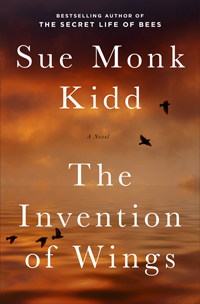The Particulars of Evil
Sue Monk Kidd heads to Nashville to read from her new novel set in pre-Civil War Charleston
Sue Monk Kidd’s bestselling 2004 novel, The Secret Life of Bees, is set against the backdrop of the burgeoning civil-rights movement. In The Invention of Wings Kidd turns the clock back further—to the slave-holding South prior to the Civil War—and tells the story of the complicated relationship between the daughter of a plantation owner and the enslaved girl who does her bidding.
 Both characters serve as narrators of the novel, which is told in alternating chapters that begin in 1803 and span more than thirty years. Hetty Handful Grimké works for the wealthy Grimké family of Charleston, South Carolina. “There was a time in Africa the people could fly. Mauma told me this one night when I was ten years old,” she remembers. “Even at ten I knew this story about people flying was pure malarkey. We weren’t some special people who lost our magic. We were slave people, and we weren’t going anywhere.” The second narrator is Sarah Grimké, the privileged daughter of a prominent jurist and a self-centered mother who oversees a household of ten children and fourteen enslaved people.
Both characters serve as narrators of the novel, which is told in alternating chapters that begin in 1803 and span more than thirty years. Hetty Handful Grimké works for the wealthy Grimké family of Charleston, South Carolina. “There was a time in Africa the people could fly. Mauma told me this one night when I was ten years old,” she remembers. “Even at ten I knew this story about people flying was pure malarkey. We weren’t some special people who lost our magic. We were slave people, and we weren’t going anywhere.” The second narrator is Sarah Grimké, the privileged daughter of a prominent jurist and a self-centered mother who oversees a household of ten children and fourteen enslaved people.
The precocious Sarah has despised slavery since age four, when she witnessed the brutal beating of a Grimké slave, a beating ordered by her own mother. When Sarah—whose motto is “If you must err, do so on the side of audacity”—receives ten-year-old Handful as a gift on her eleventh birthday, she immediately attempts to set the younger girl free. Her efforts—and her idealistic faith in the system—are quickly and mercilessly quashed. Nevertheless, the two girls gradually come to feel something akin to friendship, at least in private. As Handful puts it, “People say love gets fouled by a difference big as ours. I didn’t know for sure whether Miss Sarah’s feelings came from love or guilt. I didn’t know whether mine came from love or a need to be safe. She loved me and pitied me. And I loved her and used her. It never was a simple thing.”
Against all odds, the two women maintain an admiration and affection for each other over the next thirty years. Handful opens Sarah’s eyes to the world in which she has been raised: “I saw then what I hadn’t seen before, that I was very good at despising slavery in the abstract, in the removed and anonymous masses, but in the concrete, intimate flesh of the girl beside me, I’d lost the ability to be repulsed by it,” she says. “I’d grown comfortable with the particulars of evil. There’s a frightful muteness that dwells at the center of all unspeakable things, and I had found my way into it.”
 The Invention of Wings is based on the true story of anti-slavery activists Sarah and Angelina Grimké, who publicly spoke out against “the peculiar institution” throughout the 1830s. It depicts the growing consciousness among certain prominent whites that slavery is inherently evil—a mindset which led to the establishment of the abolitionist movement in the North. Along Sarah’s journey toward a clearer understanding of slavery and her own complicity in it, she experiences social and political censure in Charleston, travels to Pennsylvania and New Jersey, embraces Quakerism, and meets prominent free-thinking leaders of the day, including women’s-rights pioneer Lucretia Mott; William Lloyd Garrison, publisher of the radical newspaper The Liberator; Elizur Wright of the American Anti-Slavery Society; renowned orator Theodore Weld; poet John Greenleaf Whittier; and free black abolitionist Sarah Mapps Douglass.
The Invention of Wings is based on the true story of anti-slavery activists Sarah and Angelina Grimké, who publicly spoke out against “the peculiar institution” throughout the 1830s. It depicts the growing consciousness among certain prominent whites that slavery is inherently evil—a mindset which led to the establishment of the abolitionist movement in the North. Along Sarah’s journey toward a clearer understanding of slavery and her own complicity in it, she experiences social and political censure in Charleston, travels to Pennsylvania and New Jersey, embraces Quakerism, and meets prominent free-thinking leaders of the day, including women’s-rights pioneer Lucretia Mott; William Lloyd Garrison, publisher of the radical newspaper The Liberator; Elizur Wright of the American Anti-Slavery Society; renowned orator Theodore Weld; poet John Greenleaf Whittier; and free black abolitionist Sarah Mapps Douglass.
Kidd paints a vivid portrait of the lives of Sarah and Handful and the ways in which the destiny of each is controlled by others. Sarah, who yearns to make a real difference in the world, is thrust into an exhausting whirl of gowns, parties, and social expectations, including frustrating restrictions on education and ambition. She knows that in Charleston her significance will most likely depend upon the social stature of her future husband. Handful, in addition to the humiliation of being considered less than human, suffers through an exhausting and demeaning workday where physical punishment is meted out for the smallest of infractions. Without something like a miracle, her fate is to live and die at the whim of her owners.
Handful is a fictional character who dreams of traveling up the river she has only ever glimpsed from the upstairs window of the Grimké house, but she is on a different kind of journey—more claustrophobic and much more brutal than Sarah’s, one that involves espionage, separation from those she loves, state-sanctioned torture, and public execution. Her primary inspiration is her beloved mother, Charlotte. “Mauma” is a master seamstress whose story quilts tell the history of her life and pass on to her daughters a specific identity for their family—an identity that is separate from their circumstances and separate from their owners. She tells Handful, “Ain’t nobody can write down in a book what you worth,” and “When you think of me, you say, she never did belong to those people. She never belong to nobody but herself.”
Sue Monk Kidd will discuss The Invention of Wings at the Nashville Public Library on January 15 at 6:15 p.m., as part of the Salon@615 series.


